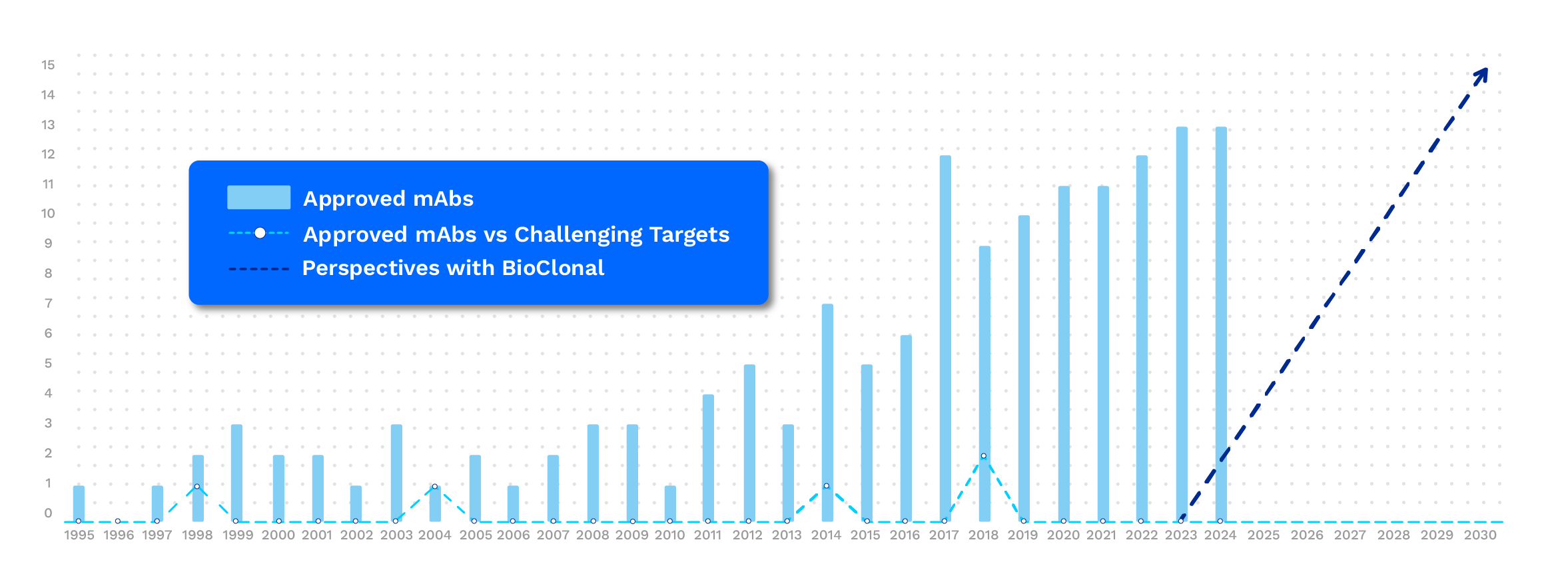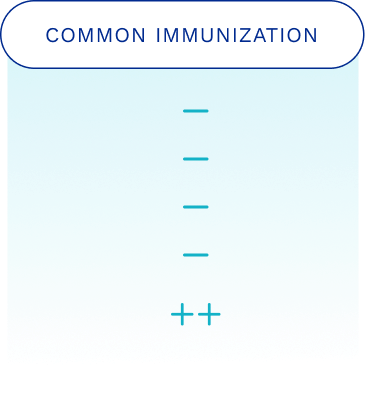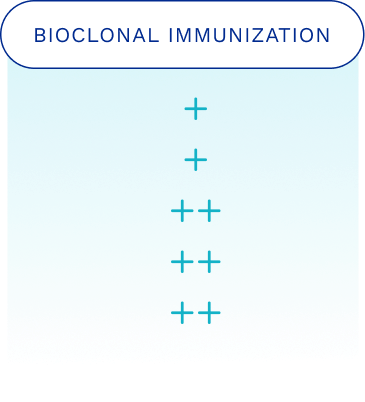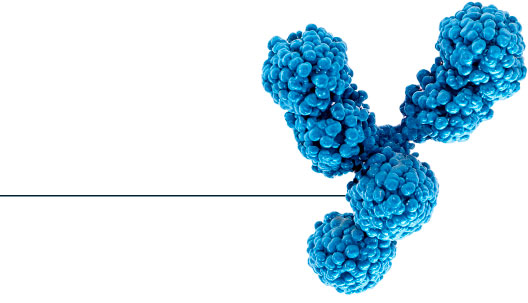A disruptive and novel science, which will revolutionize mAbs discovery. RedMabs in vivo antibody discovery platform is a disruptive tool in the immunization field. A combination of immunogen design, immunization protocols, and BioClonal adjuvants and immunomodulators originates this novel platform.


The rational antibody discovery market has been growing year by year since 2014. Today, 10 to 12 monoclonal antibodies have received approval from FDA and other organizations globally, for their use as therapeutic drugs. However, the number of monoclonal against challenging targets is not growing that fast, even though they are very relevant as therapeutic drugs. Examples of these challenging targets are transmembrane proteins, GPCR´s, or ion channels, involved in diverse and relevant diseases such as oncological, autoimmune, or inflammatory diseases. The entry barrier for these developments is a technological one, that can be broken with the BioClonal platform. Thus, BioClonal opens the gate to market to challenging targets.

Technical Advantages in Immunization with BioClonal
The application of this platform fundamentally gives rise to three phenomena:



Our Science – REDMABS Platform
Our platform succeeds in increasing the number of lineages in the murine model, in focusing the immunodominance and obtaining sequences againts even full identity sequences.
Of particular importance for this platform are low immunogenic antigens, against which antibodies cannot be obtained with traditional methods. This would be the case, for example, of very small antigens such as carbohydrates or low molecular weight proteins, poorly immunogenic epitopic areas, or immunogens with unknown whose receptor-ligand systems. The use of our adjuvants and immunomodulators, optimized for each antigen.
Let Us Work With

The development of a monoclonal antibody involves five crucial steps. From the initial target definition to the final sequence obtained, every step is vital for success. However, immunogen design and immunization are often overlooked, leading to suboptimal results.
This is where BioClonal comes in – offering a groundbreaking solution that breaks down the barriers of traditional immunization methods. With BioClonal, you can unlock the full potential of your antibody discovery process and achieve exceptional results every time.
Pipeline
Program
Therapeutic Indications
Target
Development Stage
Business Model
Target Discovery
Immunization
Hybridoma
Screening
Squence
PIPELINE
PROGRAMS
Why settle for less when you can partner with BioClonal and take your antibody discovery to the next level?
Get a free feasibility study for your project.
Contact our technical team.
Access to BioClonal’s website by the user (the “User”) implies that the User accepts in its entirety and agrees to comply completely with the terms contained in these Terms and Conditions, as well as the provisions of the Legal Notice, the Privacy Policy and the Cookies Policy.
BioClonal reserves the right to unilaterally modify, at any time and without prior notice, the conditions of the website and/or any aspect related to the content of the website, as well as the Legal Texts, so the User must read them carefully each time he/she intends to browse the website.
In accordance with the European Regulation 2016/679 General Data Protection Regulation, as well as any national law that may apply, we inform you that the personal data you provide will be processed by BioClonal S.L. as data controller, with the main purposes of responding to your request for information regarding our products and services, as well as for internal administrative purposes. Your data will not be disclosed to third parties, unless legally required.
Who is responsible for the treatment of your data?
For what purpose do we process your personal data?
In compliance with the provisions of the European Regulation 2016/679 General Data Protection Regulation, as well as any national law that may apply, we inform you that in BioClonal we process the data you provide for the following purposes:
How long will we keep your data?
Your data will be kept for the time necessary to fulfill the purpose for which they were collected and to determine the possible responsibilities that may arise from that purpose and the processing of the data, as well as the time necessary to comply with the corresponding legal obligations.
What is the legal basis for the processing of your data?
The legal basis for the processing of your data for the purpose indicated in paragraph 2 above is as follows:
To which recipients will your data be communicated?
Your data may be disclosed to public bodies and authorities (administrative or judicial) in those cases where a legal rule so provides.
What are your rights when you transfer your data to us and how can you exercise them?
You have the right to access your personal data, as well as to request the rectification of inaccurate data or, where appropriate, request their deletion when, among other reasons, the data are no longer necessary for the purposes for which they were collected.
In certain circumstances, you may request the limitation of the processing of your data, in which case we will only keep them for the exercise or defense of claims.
For reasons related to your particular situation, you may object to the processing of your data. BioClonal will stop processing the data, except for compelling legitimate reasons, or the exercise or defense of possible claims.
Likewise, you may exercise your right to data portability, as well as withdraw the consents provided at any time, without affecting the lawfulness of the processing based on the consent prior to its withdrawal.
If you wish to exercise any of your rights you can contact us by sending a written communication to the e-mail address info@bioclonal.es. Remember to provide as much information as possible about your request: Name, surname and e-mail address used.
Finally, we inform you that you can contact the Spanish Data Protection Agency and other competent public bodies for any claim arising from the processing of your personal data.
Welcome to the COOKIE POLICY of the website of BioClonal SL. with Tax Identification Number B72641327, where we will explain in clear and simple language all the necessary questions so that you can have control over them based on your personal decisions.
What are cookies and what do we use them for?
A cookie is a small information file that is stored on your computer, smartphone or tablet every time you visit our website.
In principle, a cookie is harmless: it does not contain viruses, Trojans, worms, etc. that can damage your terminal, but it does have a certain impact on your right to the protection of your personal data, as it collects certain information concerning you (browsing habits, identity, preferences, etc.).
That is why, based on the provisions of the applicable regulations (LSSI and current legislation on personal data protection), the activation of certain types of cookies will require your prior authorization.
Before doing so, we will give you some additional information that will help you to make a better decision in this regard:
Cookies can be of various types depending on their purpose.
Technical cookies are necessary for our website to function, they do not require your authorization and are the only ones we have enabled by default.
Some cookies are ours (we call them our own cookies) and others belong to external companies that provide services for our website (we will call them third-party cookies: an example could be cookies from external suppliers such as Google). In this regard, it is important for you to know that some of these external suppliers may be located outside Spain.
Globally, not all countries have the same level of data protection, with some countries being safer than others (for example, the European Union is a safe environment for your data). Our policy is to use reliable suppliers that, regardless of whether or not they are located in the European Union, have adopted appropriate safeguards for the protection of your personal information. However, you can consult the different privacy and data protection policies of each of the aforementioned external providers, in order to make an informed decision on whether or not to activate third-party cookies used by our website.
Finally, please note that, depending on the length of time they remain active, cookies can be of two types:
Session cookies: they expire automatically when you end the session on your computer, “smartphone” or tablet,. They are usually used to retain the necessary information while a service is provided to you on a single occasion.
Persistent cookies: they remain stored on your computer, smartphone or tablet for a certain period of time, which can vary from a few minutes to several years.
What kind of cookies can we use on our website?
Technical cookies:
Technical cookies are strictly necessary for our website to function and for you to be able to browse it. This type of cookies are those that, for example, allow us to identify you, give you access to certain restricted parts of the page if necessary, or remember different options or services already selected by you, such as your privacy preferences. Therefore, they are activated by default, not being necessary your authorization in this regard.
Through your browser settings, you can block or alert you to the presence of this type of cookies, although such blocking will affect the proper functioning of the different functionalities of our website.
Analysis Cookies:
Analysis cookies allow us to study the navigation of users of our website in general (for example, which sections of the page are the most visited, which services are most used and if they work correctly, etc.).
From the statistical information about the navigation on our website, we can improve both the operation of the site itself and the various services offered. Therefore, these cookies do not have an advertising purpose, but only serve to make our website work better, adapting to our users in general. By activating them you will contribute to this continuous improvement.
You can enable or disable these cookies by checking the appropriate box, being disabled by default.
Functionality and Personalization Cookies:
Functionality cookies allow us to remember your preferences, to customize to you certain features and general options of our website, each time you access it (for example, the language in which the information is presented to you, the sections marked as favorites, your browser type, etc.).
Therefore, this type of cookies do not have an advertising purpose, but activating them will improve the functionality of the website (for example, adapting to your browser type) and customizing it based on your preferences (for example, presenting the information in the language you have chosen in the past), which will contribute to the ease, usability and comfort of our site during your navigation.
You can enable or disable these cookies by checking the appropriate box, being disabled by default.
Advertising Cookies:
Advertising cookies allow us to manage the advertising spaces included on our website based on criteria such as the content displayed or the frequency at which ads are shown.
So for example, if you have been shown several times the same ad on our website, and you have not shown a personal interest by clicking on it, it will not appear again. In short, by activating this type of cookie, the advertising displayed on our website will be more useful and diverse, and less repetitive.
Behavioral Advertising Cookies:
Behavioral advertising cookies allow us to obtain information based on the observation of your browsing habits and behaviors on the web, in order to be able to show you advertising content that better suits your personal tastes and interests.
To make it easier for you to understand, we will give you a fictitious example: if your last web searches were related to thriller literature, we would show you advertisements about thriller books.
Therefore, by activating this type of cookies, the advertising we show you on our website will not be generic, but will be oriented to your searches, tastes and interests, thus adjusting exclusively to you.
You can enable or disable these cookies by checking the appropriate box, being disabled by default.
What types of cookies are currently used on our website?
Below, we proceed to inform you about all the types of cookies that are currently used on our website and the purpose of each of them.
Type of cookie, purpose, responsible entity and link to its privacy and data protection policy.
Third-party, Collect information about the navigation of users through the site in order to know the origin of visits and other similar statistical data.
Google Analytics also uses these cookies to show you advertising related to your browsing profile.
What can you do with cookies?
When you access our website for the first time, you are shown a window in which we inform you that cookies can be of various types:
Technical cookies are necessary for our website to function, they do not require your authorization and are the only ones we have enabled by default.
The other cookies are used to improve our website, to customize it based on your preferences, or to show you advertising tailored to your searches, tastes and personal interests. You can accept all these cookies by clicking on the ACCEPT button or configure or reject their use by clicking on the COOKIES CONFIGURATION section.
Also inform you that, once you have activated any type of cookies, you have the possibility to deactivate them whenever you want, with the simple step of unchecking the corresponding box in the COOKIES CONFIGURATION section of our website. It will always be as easy for you to activate our own cookies as to deactivate them.
We also remind you that, through your browser settings, you can block or alert you to the presence of cookies, although such blocking may affect the proper functioning of the various features of our website in the case of the necessary technical cookies.
Finally, if you activate third-party cookies (external companies that provide services for our website) and subsequently wish to disable them, you can do so in two ways: using the cookie disabling tools of your browser or through the systems enabled by such external providers.
To make it much easier for you, below we list a series of links to the guidelines for disabling cookies from commonly used browsers: